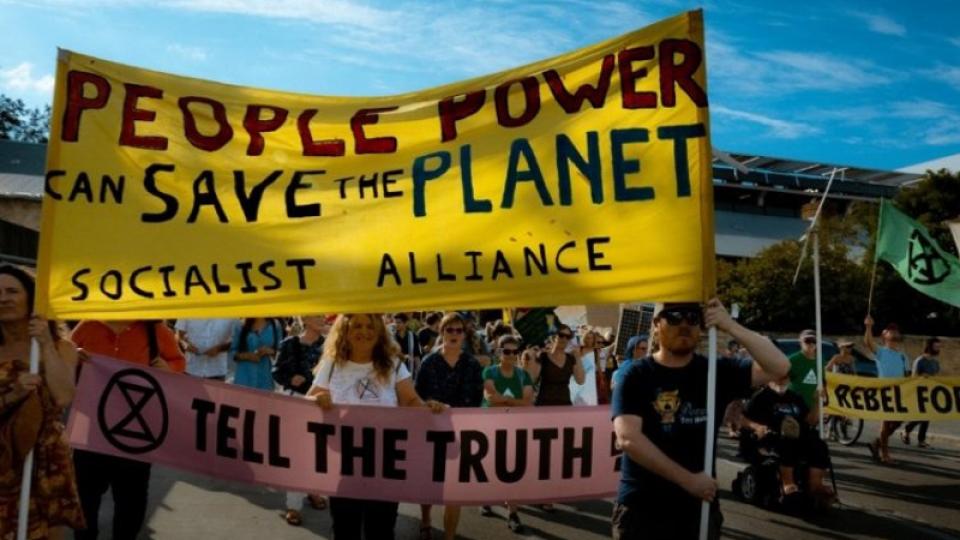What will it take to make Labor deliver on climate action?

Greens leader Adam Bandt tweeted a congratulations message to incoming Prime Minister Anthony Albanese after the election. “We’re looking forward to working together with you,” he said. “The crises facing us are urgent … we’ve got to quit coal & gas. We’ve got to fight inequality. Let’s go.”
[VIDEO::https://youtu.be/RCqcYkeJhLA::aVideoStyle]
Expectations are high that climate action will be on the agenda now the Coalition has been booted out.
The Australia Institute’s Ben Oquist said there is a climate “super majority” in parliament, potentially as big as 87 seats if Labor, Greens and the “teal independents” are all counted. (Seventy six are needed to pass legislation.)
Tim Flannery was even more effusive, saying that “climate action is the undisputed winner of this election”. Further, he said, “the Australian Parliament is now set for an unprecedented shake-up after millions of voters put climate first at the ballot box, and all eyes are on what climate action can be achieved by the incoming government”.
However, Labor has spent its first few days in government hosing down expectations.
The Financial Review reported on May 23 that “Labor’s likely Minister for Climate Chris Bowen has slapped down Greens demands for a more aggressive decarbonisation pathway that would derail new mega fossil fuel investments such as Woodside’s $16.5 billion Scarborough gas project off West Australia”.
Before the election, Labor gave guarantees — verbally and in writing — to the fossil fuel corporations that “it understood the importance of coal and gas to the economy” and was not planning to rock the boat.
Its clear message since May 21 is that it intends to implement the policy it took to the election. That is, it is steadfastly refusing to aim for anything more ambitious — the election result suggesting such a move would be popular.
While Labor’s policy of a 43% reduction in emissions from 2005 levels by 2030 looks good compared to the Coalition’s target of a 26–28% cut, it is not as good as it looks.
First, relying on emission “reductions” that have already taken place are nothing more than accounting tricks. Labor is relying on emissions reductions from the land use sector, while emissions in other sectors have grown. Labor, like the Coalition, will be claiming these “reductions” as part of the 43%.
Secondly, a key feature of Labor’s plan to “reduce” emissions is to use offsets.
Renew Economy reported on May 24 that the “price of Australian Carbon Credit Units has surged on the first day of trading after the federal election”. This means that corporate Australia recognises that there will be changes.
However, it said Labor will “rely heavily on repurposing the Coalition’s existing Safeguards Mechanism to drive down emissions”. In other words, companies will be purchasing often dubious carbon “offsets” to continue polluting instead of reducing emissions.
Thirdly, according to analysis by Climate Analytics, Labor’s goal is not even consistent with the Paris climate agreement. If it was fully implemented and matched around the world, it would not keep warming under 1.5°C and — only with optimistic assumptions — might keep the world below 2°C degrees by 2100.
People need to learn to judge Labor not by comparison with the climate-denying Coalition, but by how well it responds to the climate emergency.
After almost a decade of the pro-fossil fuel Coalition, there is a strong temptation to give Labor “a chance” and not demand it steps up to meet the climate challenge.
Labor’s determination to push ahead with the catastrophic Scarborough Gas project, along with opening up the Beetaloo Basin in the Northern Territory, proves we cannot give it a “honeymoon”.
It is good the Greens are pushing the Albanese government to “pause” Scarborough and other fossil fuel developments in their early stages of development. This needs to be backed up with pressure from an emboldened grassroots climate movement.
As Socialist Alliance national co-convener Sam Wainwright told the recent Green Left Show: “The change we’d need to stop runaway global warming would require a social movement on a scale that we’ve never seen before in this country.”
The election result should give us the confidence to build such a people-powered protest movement.
[Alex Bainbridge is a member of the Socialist Alliance National Executive.]